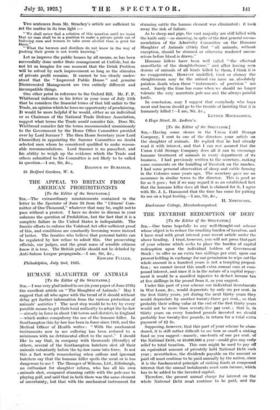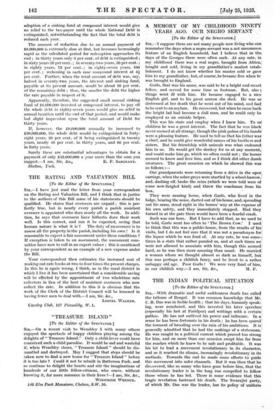THE FEVERISH REDEMPTION OF DEBT
[To the Editor of the SPECTATOR.]
SIR,—One turns hopefully to any well-thought-out scheme whose object is to reduce the crushing burden of taxation, and I have read with great interest your recent article under the above heading. I trust, however, you will not press that part of your scheme which seeks to place the burden of capital redemption upon the individual holders of Government Stock : to offer us an extra two shillings per cent. upon our present holding in exchange for our permission to wipe out the whole amount in a hundred years is not a tempting proposi- tion ; we cannot invest this small extra annual sum at com- pound interest, and since it is in the nature of a capital repay- ment it would be a manifest injustice to deduct income tax at five shillings in the pound from it, as you suggest.
Under this part of your scheme our individual investments in War Loan, &c., would depreciate by only six per cent. in the first thirty years, yet during the next thirty years they would depreciate by another twenty-three per cent., so that probably their selling value at the end of the first thirty years would not be more than seventy-five per cent. ; that is, in thirty years on every hundred pounds invested we should probably lose twenty-five pounds, in return for a total extra payment of £2 5s.
Supposing, however, that this part of your scheme be aban- doned, it is still rather difficult to see how so small a sinking fund as you suggest—namely, one-tenth of one per cent. of the National Debt, or £8,000,000 a year—could give any early relief to total taxation. This sum might be used to pay off an equivalent amount of privately held National Debt each year ; nevertheless, the dividends payable on the amount so paid off must continue to be paid annually by the nation, since it is the fundamental principle of sinking funds at compound interest that the annual instalments must earn income, which has,to be added to the invested capital.
Therefore, the present annual charge for interest on the whole National Debt must continue to be paid, and the
adoption of a sinking- fund at compound interest would give no relief to the tax-payer until the whole National Debt is extinguished, notwithstanding the fact that the total debt is reduced each year.
The amount of reduction due to an annual payment of /8;000,000 is extremely slow at first, but becomes increasingly rapid as the calculated period for redemption approaches its end ; in thirty years only 6 per cent. of debt is extinguished ; in sixty years 80 per cent. ; in seventy-two years, 50 per cent. ; in eighty years, 73 per cent. ; in eighty-seven years, 100 per cent. ; reckoning in each case compound interest at 41 per cent. Further, when the total amount of debt was, say, halved in seventy-two years, the interest and sinking fund, payable at its present amount, would be about 10 per cent. of the remaining debt ; thus, the smaller the debt the higher the rate payable in respect of it.
Apparently, therefore, the, suggested small annual sinking fund of £8,000,000 invested at compound interest, to pay off the whole debt in eighty-seven years would give no relief in annual taxation until the end of that period, and would make but slight impression upon the total amount of Debt for thirty years.
If, however. the £8,000,000 annually be increased to £50,000,000, the whole debt would be extinguished in forty- eight years, 20 per cent. of it being extinguished in twenty years, nearly 40 per cent. in thirty years, and 66 per cent. in forty years.
Surely these are substantial advantages to obtain for a payment of only £42,000,000 a year more than the sum you



























































 Previous page
Previous page